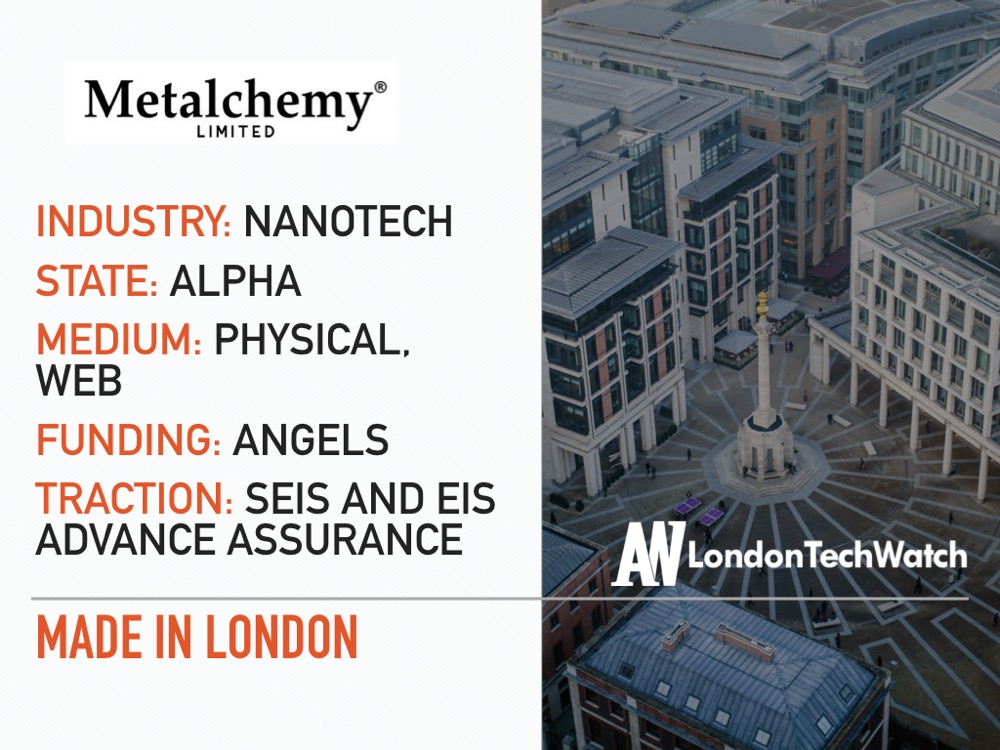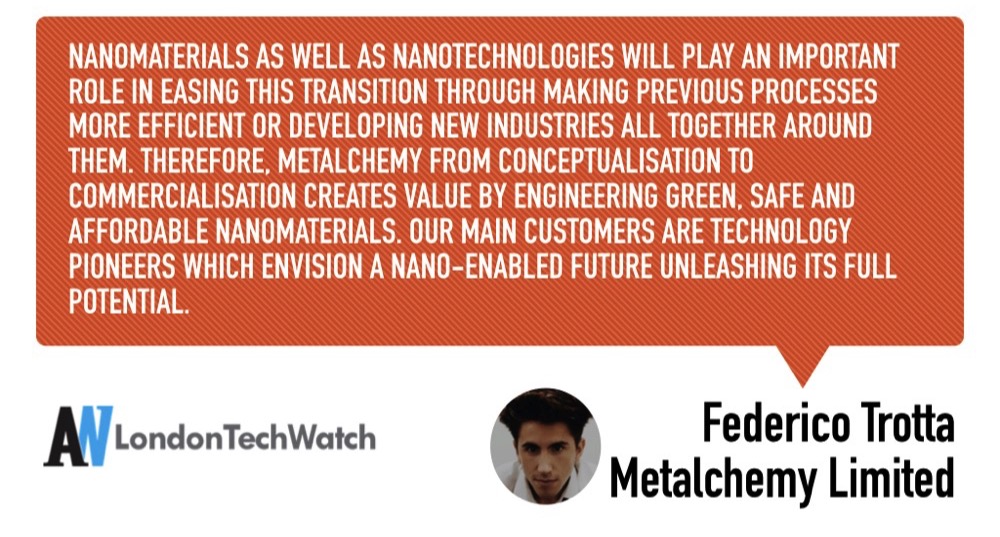The common adage ‘good things come in small packages’ is definitely true if you talk to the founder of the highly anticipated chemical manufacturing startup – Metalchemy Limited. Metalchemy Limited has developed a cutting-edge process to manufacture green nanomaterials (1nm-100nm). Traditional manufacturing processes for nanomaterials is costly and highly toxic. Metalchemy breaks through these barriers by creating an eco-friendly, inexpensive chemical process that increases the access to nanoparticles. Metallic nanoparticles have a wide range of use that include biomedical imaging, personalised medicine, 3D printing, and more. The nanomaterials market was worth $14.7B in 2015 and is projected to grow to $55B in 2022.
London TechWatch caught up with CEO and Cofounder Federico Trotta to learn more about nanomaterials and Metalchemy’s future roadmap, which includes awaiting approval for its patent and commercializing its nano-products over the next two years.
Tell us about the product or service Metalchemy Limited offers.
Metalchemy is a startup developing cutting edge green nanomaterials. Nanomaterials is a classification for materials that are between 1nm to 100nm. Due to their very small size, these otherwise normal materials exhibit novel properties at these extremely small scales. Nanomaterials, such as carbon nanotubes or metallic nanoparticles, can be used as building blocks for various nanotechnological purposes. Metallic nanoparticles have a range of applications, both present and future. Some examples include antimicrobial products, cosmetics, food packaging, 3D printing, biomedical imaging, drug delivery, personalised medicine, next-generation batteries, structure enhancers and information processing and storage, including their potential use in quantum computing and nanoelectronics.
 Tell us a little about your background and what inspired the business?
Tell us a little about your background and what inspired the business?
We are founded by likeminded individuals who believe nanomaterials are the path to the future whilst raising awareness for the technology and potential to humankind.
When I decided to study Chemical Engineering, I did so knowing that I wanted to help as many people as I possibly could through scaling up processes. I also had the opportunity to volunteer to be the co-chair of the British Science Association (London). This allowed me to develop my strong determination in helping others as well as sharing my passion for science. During my university studies, I became extremely interested in nanotechnologies as well as their practical applications. However, I quickly became aware that most current nanomaterials manufacturing is done using toxic chemicals for both the users and the environment. On top of it, the prices of nanomaterials are so high that only a few people can access them for practical purposes.
Therefore, I decided to build a company that thrives through innovation. Metalchemy was born as soon as I realized that I could help others by putting my passion for science and engineering knowledge to work for a better world.
How is Metalchemy Limited different?
Currently, manufacturing nanomaterials requires toxic chemicals harmful to the user and the environment. Moreover, production is flawed with wasteful amounts of energy and material resources being deployed inflating the cost. This restricts their use to a select elite with expert technical knowledge. We deemed this was unfair, as technological breakthroughs should be accessible for the benefit of all. Therefore, we decided to fight for safer, green, and universal solutions which would benefit humankind. We, therefore, developed a green chemical process to manufacture nanomaterials.
What market are you attacking and how big is it?
We are targeting the nanomaterials market. The market was worth $14.7 billion in 2015 and is expected to expand to $55B in 2022 at a Compound annual growth rate (CAGR) of 21% (Allied Market Research). Nanomaterials as a market includes nanoparticles, nanocellulose, carbon nanotubes, and graphene.
What is the business model?
Our business model bases itself on the development of green and socially responsible next-generation products that are affordable to all. In a world under pressure to use resources more efficiently, sustainable, and optimised chemical processes will play a crucial role in the green transition required to combat climate change. Nanomaterials as well as nanotechnologies will play an important role in easing this transition by making previous processes more efficient or developing new industries all together around them. Therefore, Metalchemy from conceptualisation to commercialisation creates value by engineering green, safe and affordable nanomaterials. Our main customers are technology pioneers which envision a nano-enabled future unleashing its full potential.
How has COVID-19 impacted the business?
COVID-19 hasn’t impacted too much the business because we were able to switch to smart working which allowed us to move forward and achieve all our milestones despite the lockdown. Our business has been designed to be extremely flexible and adaptable which allowed the founders to take swift decisions when the wind changed in early March. Great communication between the founders has proven itself a great asset for the team.
Tell us what building your company in London has been like?
Building a start-up in London has been a challenging but extremely rewarding experience. In the past year, I was able to learn so much about practical business issues and how to solve them quickly in a landscape as dynamic as London. The city is full of opportunities and support for young entrepreneurs as well as extremely talented people which I will always be grateful for supporting me and the business.
What are the milestones that you plan to achieve within six months?
Now that we have officially opened up a production facility in London and filed for a patent, we would like to begin commercializing our nano-products in the next 18/24 months. This means growing our client base as well as aiming for a seed funding round in early 2021 to support a full commercial expansion in the U.K and then throughout the E.U. This should be made easier since we received both SEIS and EIS Advance Assurance which should promote equity injections. On top of this, we want to raise awareness about nanomaterials and how they can make a real impact in solving global issues such as climate change through interviews such as these.
This means growing our client base as well as aiming for a seed funding round in early 2021 to support a full commercial expansion in the U.K and then throughout the E.U. This should be made easier since we received both SEIS and EIS Advance Assurance which should promote equity injections.
If you could be put in touch with one person in the London Tech community who would it be and why?
I would say Anthony Rose from Seed Legals. Seed Legals has been instrumental in setting up the business and getting our legal paperwork ready to go with a highly professional and friendly team always there for their start-ups. I would like to thank him and his team personally for the awesome work their business is doing for start-ups such as mine which need a lot of support for growth, especially at an early stage.
What does being “Made in London” mean to you and your company?
Made in London to us means excellence through innovation. This is uniquely possible in London since it is a great hub for dreamers coming together from across the world sharing ideas for a better future.
What else can be done to promote early-stage entrepreneurship in London?
When I opened my business, I felt a bit lost and had to invest most of my personal savings in order to bootstrap my idea and make a business out of it. However, passion and coffee (quite a lot of it) allowed me to always push forward. If there would be more financial support – for instance in the form of grants combined with mentoring – that could make a huge difference. I have learned that young engineers may have some awesome ideas but most of the time they will need help in other sectors, especially warm introductions with investors which are always more effective than thousands of copy-paste emails.
What is your favorite restaurant in London?
My favorite restaurant in London is without doubt Delfino’s in Mayfair! I absolutely love their pizza and it is a great venue for informal meetings with investors.
You are seconds away from signing up for the hottest list in London Tech! Join the millions and keep up with the stories shaping entrepreneurship. Sign up today





